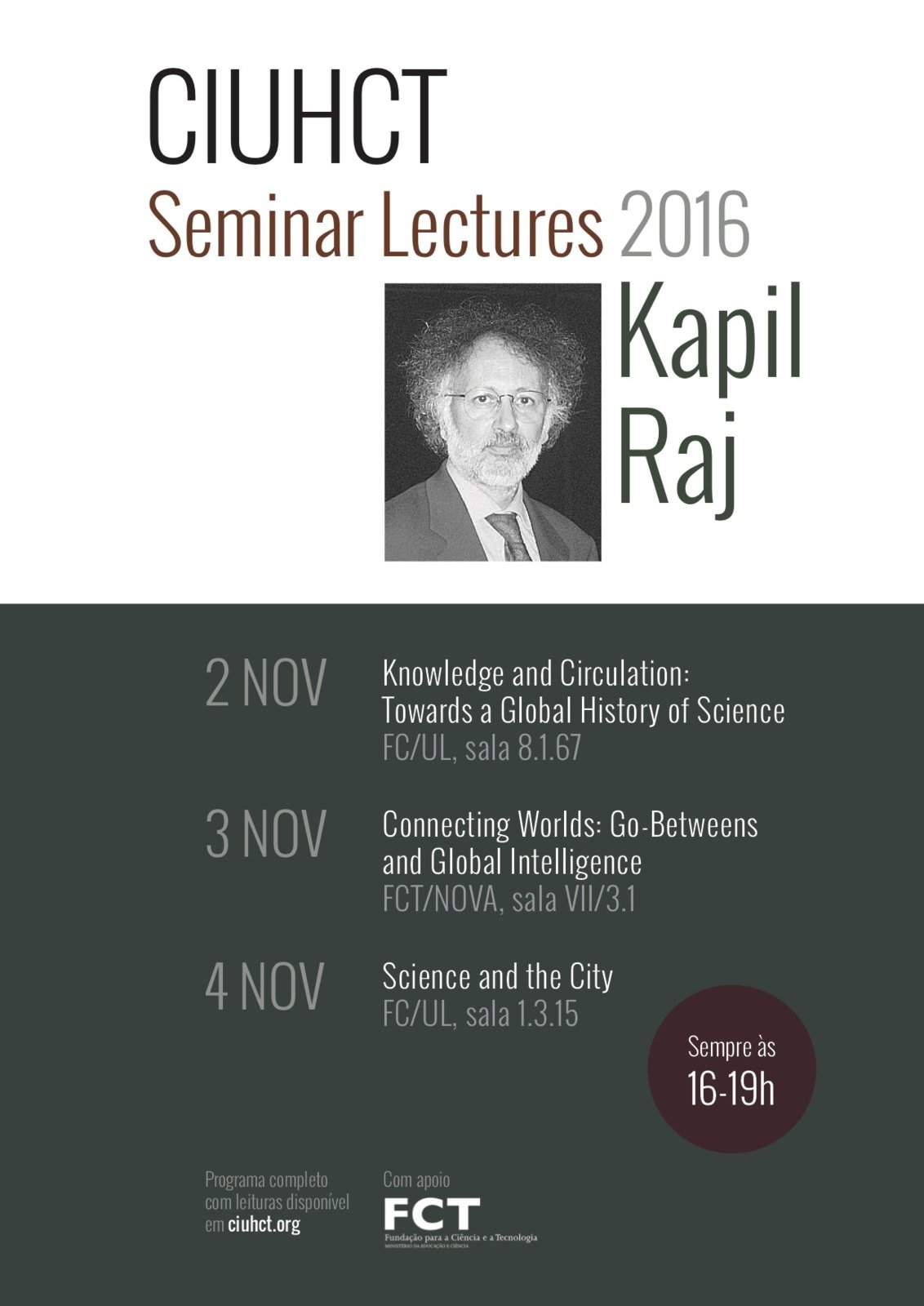Short courses
Production of Science Communication Activities
2017-2024
Co-organized by CIUHCT (Cristina Luís) and cE3c (Patrícia Garcia Pereira), this is a course that will introduce participants to the details of communicating science to non-specialized audiences, including public and private stakeholders, teachers and students, and media professionals.
The course will particularly address the design, organization, implementation and impact assessment of public engagement activities, such as exhibitions, science festivals, and games. By the end of the course, students should be able to develop and produce small-budget events or products aimed at communicating scientific results and ideas.
For more information please contact Cristina Luís) (cmluis@fc.ul.pt).
Strategies for Citizen Engagement in Science Communication
2022-2024
Co-organized by CIUHCT (Cristina Luís) and cE3c (Patrícia Tiago). This course aims to explore ways of communicating science to non-specialist audiences, such as policy-makers, industry, and the general public (including students and teachers), through their involvement and participation in citizen science activities. The course will particularly address co-creation as an effective tool for designing, organizing, implementing and analyzing the impact of public engagement in scientific activities. By the end of the course, students should be able to select and develop engaging initiatives to communicate scientific results and ideas.
For more information contact Cristina Luís (cmluis@fc.ul.pt).
Permanent Seminar on Ancient Astronomy
This seminar is organised by CIUHCT and the Departament of History and Philosophy and Sciences (FCUL) since 2018, dedicated to the history of ancient astronomy, widening the concept to historical aspects of the discipline, and others connected to it, until the 19th century.
Following a monthly schedule, this intends to be a space for discussion of topics of an essentially technical nature, meaning, unafraid to approach mathematics, calculus, and complicated languages.
The themes can go from esential mathematical technicques from the Almagest, the calculation of calendars and astrological practices, to the models of Cosmos for astronomical navigation and instruments. Sessions in portuguese.
schedule of sessions
Cartometric Analysis and Numerical Modeling
March to April 2018
Open and free course for all interested parties, lectured by Joaquim Alves Gaspar, in the context of the MEDEA-CHART project, at the Faculty of Sciences of the University of Lisbon, from February 16 to April 27, 2018.
The courses aims to provide an introduction to cartometric methods of geometrical analysis and numerical modeling, which can be applied to the study of ancient maps and charts. Although targeted, mostly, to training the team of the MEDEA-CHART project, the course is extended to all teachers, researchers and students wanting to attent. The classes will be in english and no previous registration is required.
The sessions, of 90 minutes each, will take place on February 2, 9, and 16, and March 23, in room 6.2.52, and April 6, 13, 20 and 27, in room 8.2.14, starting at 10:30am.
The MEDEA-CHART project (funded by the European Research Council) has as its main goal to solve a number of crucial questions related to the origin, the technical evolution and the use of nautical charts, from the Middle Ages to the Renaissance. For more information, see the post in the project's official webpage.
Seminar Lectures. With Kapil Raj
November 2016
From November 2 to 4, CIUHCT offers a set of seminar lectures with esteemed historian, Kapil Raj (Centre Alexandre Koyré, Paris), mainly targeted to master and PhD students, as well as post-doc and other researchers from our center, but open to all interested. Entrance is free.
The lectures will take place at the Faculty of Sciences of the University of Lisbon (days 2 and 4), and the Faculty of Sciences and Technology of the University of Lisbon (day 3), between 16h and 19h, in the rooms indicated below.
- November 2. Knowledge and Circulation: Towards a Global History of Science
- Talk by Kapil Raj. 1 hour long, followed by discussion. At FCUL, C8 building, room 8.1.67
- November 3. Connecting Worlds: Go-Betweens and Global Intelligence
- Short presentations (20 minutes maximum) by Kapil Raj and two CIUHCT researchers (um one junior and one senior), followed by discussion. At FCT/NOVA, building VII, room 3.1.
- Maria Paula Diogo, Making Europe: Europeans Globalizing
- Antonio Sanchez, Iberian Science
- Kapil Raj, Connecting Worlds: Go-Betweens and Global Intelligence
- Short presentations (20 minutes maximum) by Kapil Raj and two CIUHCT researchers (um one junior and one senior), followed by discussion. At FCT/NOVA, building VII, room 3.1.
- November 4. Science and the City
- Short presentations (20 minutes maximum) by Kapil Raj and two CIUHCT researchers (um one junior and one senior), followed by discussion. At FCUL, C1 building, room 1.3.15.
- Kapil Raj, The Historical Anatomy of a Contact Zone: Calcutta in the 18th Century
- Marta Macedo, Scientific Capital: Science in Lisbon and the construction of Portugal in the 19th and 20th centuries
- Ana Simões, Visions of Lisbon. Science, technology and medicine and the making of a techno-scientific capital (1870-1940)
- Short presentations (20 minutes maximum) by Kapil Raj and two CIUHCT researchers (um one junior and one senior), followed by discussion. At FCUL, C1 building, room 1.3.15.
Science for Love: No Authors, No Experts, No Owners. With Antonio Lafuente
September to October 2015
This course, lectured by Antonio Lafuente (CSIC, Madrid), will function as a mandatory module for students of the Advanced Topics of History and Philosophy chair, in the PhD Program in History and Philosophy of Sciences, and also the Master in History and Philosophy of Sciences, both from the Faculty of Sciences of the University of Lisbon. It is also open to all other teachers, researchers, and students, the University of Lisbon community, and the general public. Sessions will be three hours long, lectured in spanish, and begin, alternatively, at 7pm and 4pm, at FCUL, c8 building, room 8.2.12.
LIST OF SESSIONS
- September 28. Ciência Popular. Da ciência como espetáculo ao espetáculo da ciência
- September 29. Ciência Militante. Da ciência crioula às novas cosmopolíticas
- September 30. Ciência Informal. Da cultura amadora às práticas hackers
- October 1. Ciência Colateral. Da crise dos peritos ao corpo comum
Integrated History and Philosophy of Science. With Theodore Arabatzis
September to October 2014
This course, lectured by Theodore Arabatzis (Departament of Philosophy and History of Science, University of Athens), will function as a mandatory module for students of the Advanced Topics of History and Philosophy chair, in the PhD Program in History and Philosophy of Sciences, and also the Master in History and Philosophy of Sciences, both from the Faculty of Sciences of the University of Lisbon. It is also open to all other teachers, researchers, and students, the University of Lisbon community, and the general public.
The five sessions will take place between September 29 and October 3, starting, alternatively, at 7pm, or 4pm, and lasting three hours, at FCUL, c8 building, room 8.2.12. See the syllabus below for more information (its dates were since revised).
Download syllabus (pdf / 95.51 KB)Reading the Almagest and De revolutionibus. Mathematical techniques of ancient astronomy
March to April 2012;
November 2010 to January 2011;
March to April 2010
Mathemata mathematicis scribuntur [mathematics are written for mathematiciens] — which is to say: one who doesn't understand the technical aspects, can't understand anything. This was Copernicus' defense (De rev, preface), anticipating the opposition waiting his innovative proposal. Unfortunately, his advice was not respected, neither by his contemporaries, nor by legions of commentators, confident they can understand Copernicus' "revolution" without understanding his mathematics.
The goal of this course, lectured by Henrique Leitão, consists of an introduction to the reading of two fundamental works in the history of astronomy: Ptolemy's Almagest, and Copernicus' De revolutionibus. On saturdays, from 2.30pm to 4.30pm, at the Faculty of Sciences of the University of Lisbon, c4 building, room 4.2.07.

